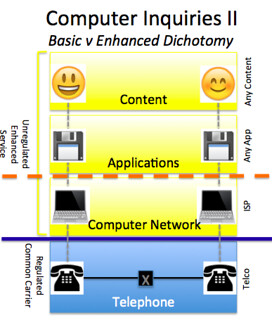Today's case: FTC v. American eVoice, Ltd, et al, CV-13-03-M-DLC (DC Montana Mar. 14, 2017). See also Stipulated Permanent Injunction.
The FTC brought an action against Defendants claiming that they were engaged in cramming, adding unwanted voicemail, electronic fax, and call forwarding services to consumers bills to the tune of $70 million. Slip at 3. The FTC concluded that this was a violation of Sec. 5 of the FTC Act, which prohibits "unfair or deceptive acts or practices in or affecting commerce." Slip at 3.

Defendants filed a motion to dismiss, arguing that they are common carriers and therefore exempt from FTC jurisdiction. This argument had been successful recently. In FTC v. ATT Mobility (9th Cir. Aug. 2016), the FTC had brought an action against ATT Mobility for data throttling (before the FCC's Open Internet order declaring Internet access service a telecommunications service). The 9th Circuit found that ATT Mobility had the status of a common carrier, therefore the FTC lacked jurisdiction over ATT Mobility. Specifically, Sec. 5 states that the FTC lacks jurisdiction over "common carriers subject to the Acts to regulate commerce." The term "common carrier" is not defined in Sec. 5. The 9th Circuit conducted an extensive review, concluding that the language applied generally to firms that have the status of being a common carrier, and not specifically only to actions that constitute the provision of common carriage. In other words, according to the holding of the 9th Circuit, the FTC lacks jurisdiction over ATT Mobility even if ATT Mobility is selling hot dogs out of a push cart because ATT Mobility has the status of common carriage for some other part of its business.
The Court cites to Computer II authority, for which it gets my thumbs up. But of course Computer II has been superseded by the Telecommunications Act of 1996 which codified definitions for an "information service" (a.k.a. "enhanced services") and a "telecom service." An "Information Service" is
the offering of a capability for generating, acquiring, storing, transforming, processing, retrieving, utilizing, or making available information via telecommunications, and includes electronic publishing... - 47 U.S.C. § 153(20)By contrast, a "telecom service"
means the offering of telecommunications for a fee directly to the public 47 U.S.C. § 153(53)And of course, "telecommunications"
means the transmission, between or among points specified by the user, of information of the user’s choosing, without change in the form or content of the information as sent and received. 47 U.S.C. § 153(50)As the court states, telecom service is essentially a pipeline. It is the transmission layer of the communications service. It pretty much is someone saying "hi grandma" into a telephone network and "hi grandma" comes out the other end.
Anything more than that is an "information service." This is a bright line test. If "hi grandma" is spoken into the network and "Bonjour Grand-mère" comes out the other end of the network, you gots yourself "a change in the form or content of the information" sent.
The FCC and the courts have been deciphering the distinction between "information services" and "telecommunications services" for more than half a century. There is a bit of precedent here. What we know, according to the court, is that defendants offered "voicemail, electronic fax, and call forwarding." Have previous courts and the FCC passed on whether these are "information services"? Yes they have.
Service
|
Classification
|
Authority
|
| Voicemail | Information Service | CPE Order 2001 ¶ 2; FWD MOO; Stevens Report, ¶ 73; BOC Petition Order 13770-774, App. A; Computer II Final Decision, ¶ 98; In re Southwestern Bell CEI Plan for the Provision of Voice Messaging Services, DA 88-1469, Memorandum Opinion and Order, 3 FCC Rcd. 6912, 65 Rad. Reg. 2d (PF) 527, 1 (September 29, 1988); Petition USTelecom2013 ¶ 20; Computer III Further NPRM 1998 ¶ 1 |
| Electronic Fax | Information Service | (actually, the court does not describe what 'electronic fax' is so I am not 100% confident but....) :: Computer III Further NPRM 1998 ¶ 1; Review of Customer Premises Equipment and Enhanced Services Unbundling Rules in the Interexchange, Exchange Access and Local Exchange Markets, CC Docket No. 98-183, Further Notice of Proposed Rulemaking, para 1, n. 20 (October 9, 1998); MOO, Bell Operating Companies Joint Petition for Waiver of Computer II Rules, DA 95-36, 10 FCC Rcd 1724 n.3, 1995 FCC LEXIS 217 **2 (Jan 1995) |
| Call Forwarding | Telecom Service | Stevens Report, ¶ 73; Computer II Final Decision, ¶ 98 |
Whoops. That did not go as planned. "Call Forwarding" is a "Telecom Service"?? According to Computer II
We indicated that 'computer processing applications such as call forwarding, speed calling, directory assistance, itemized billing, traffic management studies, voice encryption, etc., may be used in conjunction with 'voice' service.' The intent was to recognize that while POTS is a basic service, there are ancillary services [a.k.a. adjunct services] directly related to its provision that do not raise questions about the fundamental communications or data processing nature of a given service. Accordingly, we are not here foreclosing telephone companies from providing to consumers optional services to facilitate their use of traditional telephone service. - Computer II Final Decision, ¶ 98.Ah! So now we have to introduce one more concept: adjunct services. According to the FCC, adjunct services are services that may involve something that looks like an information service but facilitates the operation of the telecommunications service. Adjunct services take on the regulatory classification of the facilitated telecom service. Here is a simple example. If you call directory assistance to get a telephone number so that you can make a call, that's an adjunct service and therefore a telecom service. If however you call directory assistance with a reverse lookup, querying with a telephone number and asking for the name, that is an information service because that reverse lookup does not facilitate the operation of the telecom service (you already have the telephone number; getting the name doesn't help set up the call).
The policy behind this exception was that telecom services like ATT and the Baby Bells were prohibited from providing information services pursuant to the 1956 Consent Decree. The FCC wanted ATT to be able to offer services that facilitated operation of the telecommunications service - things like directory assistance, call forwarding, speed dialing, and caller ID. So the FCC classified these very telephone-like things as "adjunct-to-basic" services. The Telecommunications Act codified this as the Telecom Management Exception.
But an adjunct service must be adjunct to something. An adjunct service that is adjunct to nothing - this has no meaning. If ATT offers call forwarding, then this 'enhancement' facilitates the use of ATT's telecom service and therefore takes on the regulatory classification of ATT's telecom service (in other words, the "information service prohibition" would not have blocked ATT Mobility from offering this service). However, a company that just offers call forwarding but does not also offer a telecom service wasn't prohibited from offering information service in the first place and cannot offer an adjunct service to a non-existent telecom service. Thus, a stand-alone enhancement like call forwarding falls within the "information service" bucket and not the "adjunct service therefore telecom service" bucket.
According to the court, "there is no evidence before the Court that the corporate Defendants operated a transmission pipeline" [a.k.a. telecom service]. Slip at 10. Unlike ATT Mobility which had the status of "common carrier" because some part of that company offers common carrier service (even though other parts of the company do not), no part of Defendants companies were found to offer "telecom service," thus Defendants do not fall within the FTC exception to jurisdiction over common carriers.
Oh, by the way, the Court noted a further problem with Defendants' claim to be "common carriers." According to the Court, they had not registered with the FCC as common carriers; they had not named an agent for service of process as a common carrier; they made no showing that they complied with common carrier obligations like paying into the universal fund. Slip at 11. Adding to the jurisprudence of the Duck Test, the Court concluded that these Defendants don't quack like a duck.
Defendants' Motion to Dismiss on the grounds that Defendants are common carriers outside the jurisdiction of the FTC dismissed.


No comments:
Post a Comment